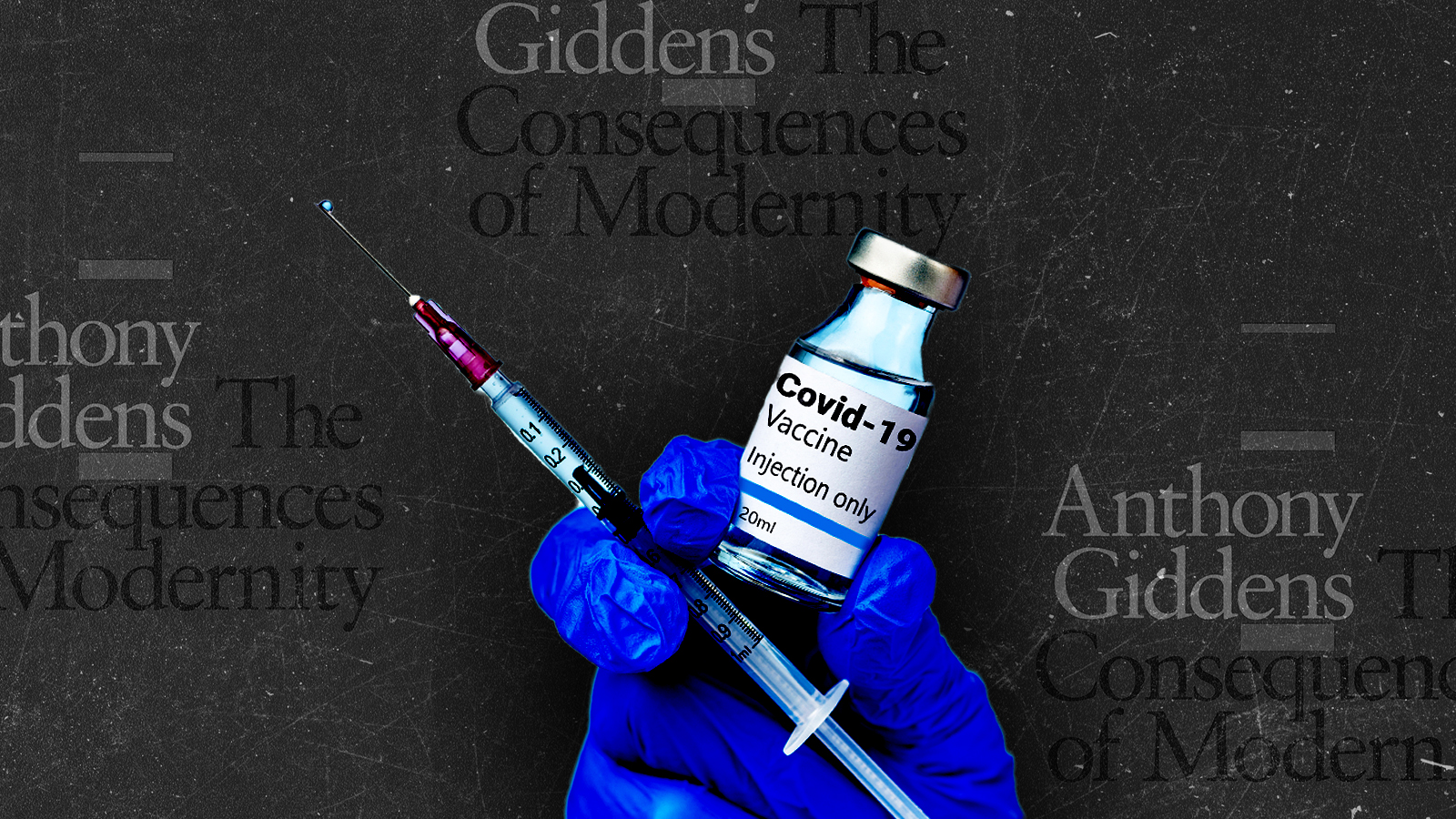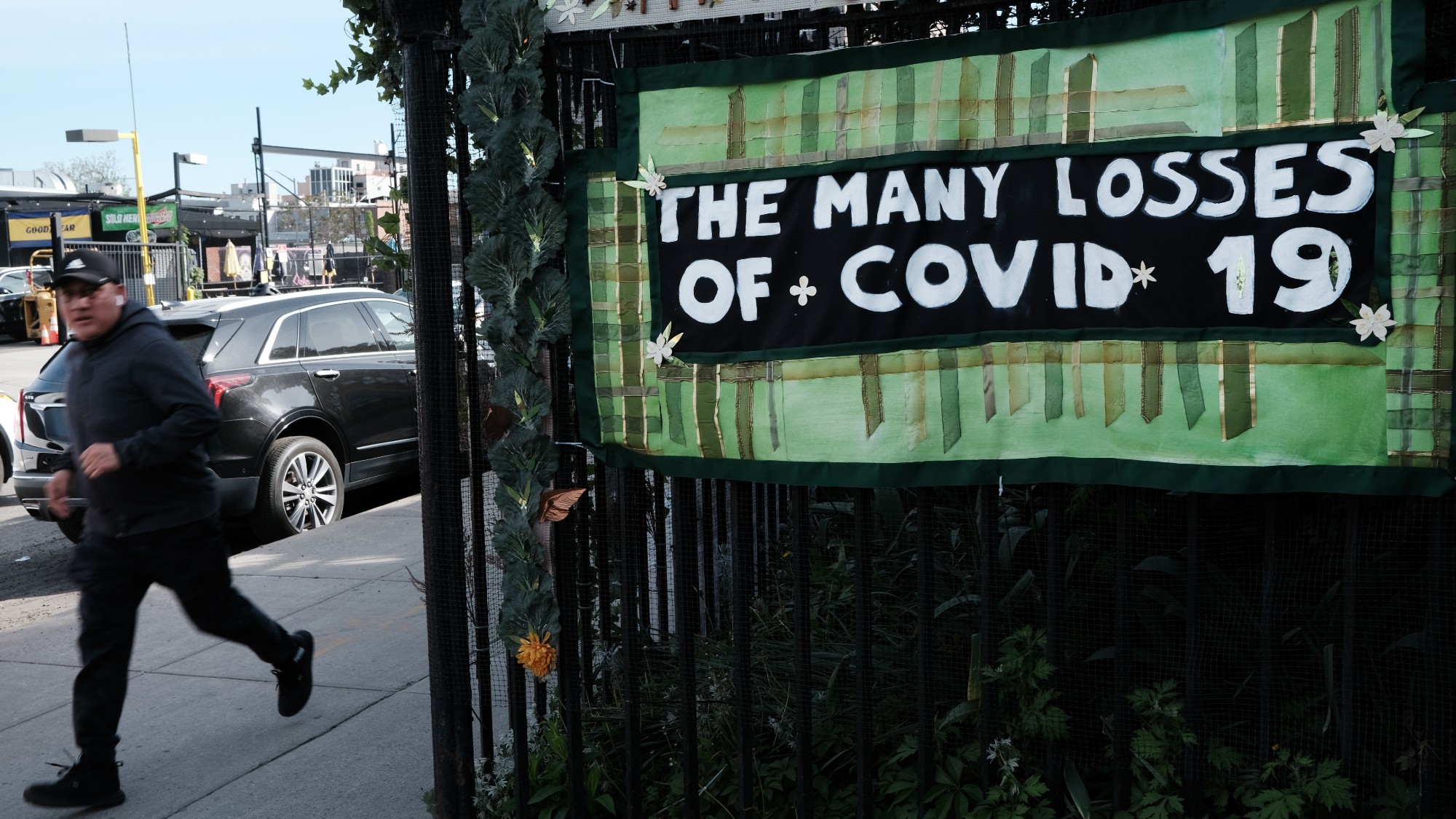Vaccine refusal and the bargain of modernity
The marvels of modern life require us to trust things we don't understand. But that trust can be lost.


A free daily email with the biggest news stories of the day – and the best features from TheWeek.com
You are now subscribed
Your newsletter sign-up was successful
In 1990, the British sociologist Anthony Giddens published a book called The Consequences of Modernity, in which he asks a simple question: "Why do most people, most of the time, trust in practices and social mechanisms about which their own technical knowledge is slight or nonexistent?" Giddens argued that many of the extraordinary marvels of modern life are made possible by widespread trust in what he calls "expert systems,"and noted that we encounter them routinely in daily life, in ways we rarely think about.
Commercial air travel and rail transit are expert systems. So are medicine, science, and government. Every time we climb into a car built this century, we are placing our lives in the hands of engineers and computer programmers we will never meet and whose intricate handiwork we only dimly understand, if at all. And Giddens cautioned that the freely given and almost automatic trust that we place in the designers and operators of such systems shouldn't be taken for granted.
Perhaps nothing has proven him right more than the choice by a large percentage of Americans to refuse the miraculous COVID-19 vaccines. Infuriatingly, resistance to vaccination has broken down along partisan lines, and the GOP's destructive embrace of this kind of conspiratorial thinking will likely kill thousands of rank-and-file Republicans. But this problem isn't just about partisanship. Instead, as Giddens taught, it is a feature of modernity as we live it, an almost inevitable byproduct of social complexity that can only be better managed rather than eradicated.
The Week
Escape your echo chamber. Get the facts behind the news, plus analysis from multiple perspectives.

Sign up for The Week's Free Newsletters
From our morning news briefing to a weekly Good News Newsletter, get the best of The Week delivered directly to your inbox.
From our morning news briefing to a weekly Good News Newsletter, get the best of The Week delivered directly to your inbox.
Almost five years ago, Damon Linker wrote here in The Week about the way that political entrepreneurs have weaponized distrust as a means to tear down existing institutions and to replace them with something new and more radical. He lamented that the "trustworthiness of the authorities" who direct expert systems "has been under direct and continuous attack for the past several decades." Linker blamed the rise of conspiracy thinking mostly on right-wing media personalities for the "continuous artillery fire" they have trained for decades on the institutions that underpin liberal democracy.
That's obviously part of the problem, especially with the COVID vaccines. Hostility to the shots was cynically cultivated by far-right figures like former President Trump and the usual suspects on Fox News and the right-wing media ecosphere. An anti-vaccine posture has now become so de rigueur on the right that it was practically a running theme of this year's Conservative Political Action Conference (CPAC), most theatrically when Colorado Rep. Lauren Boebert shouted "Don't come knockin' on my door with your Fauci Ouchie" to the delirious throngs.
But more fundamentally, it is the dense web of expert systems, only a handful of which most individuals meaningfully understand in a single lifetime, which produces recurring crises of trust and faith in our institutions. Giddens argues that mistrust is a natural part of the lay person's relationship with science. He writes that "ignorance always provides grounds for skepticism or at least caution," given that we frequently are asked to trust expert systems with our lives, or the lives of our children, about which we might be even more protective. He calls this the "bargain with modernity" that we must make to live normally in society without being consumed by constant fear and doubt.
Vaccines exist at the confluence of multiple expert systems, all of which are heavily politicized in the current era of polarization – medicine, science, and public health. Even without decades of destructive activism, starting with early anti-vaxxers like former MTV personality Jenny McCarthy, vaccines would still be a tough sell for some. You are asking people to take a risk, however infinitesimal, to prevent an ailment they have not yet, and might never, contract. No matter how airtight your faith in science might be, wandering over to the local CVS to have a stranger plunge a cocktail of messenger RNA, lipids, and other chemicals into your arm does require a leap of faith.
A free daily email with the biggest news stories of the day – and the best features from TheWeek.com
The effort to produce vaccines against COVID-19 was global and heroic. It won't be long before some filmmaker produces a banger of a thriller about the development of the mRNA technology of the Pfizer and Moderna shots. Yet there have been hiccups, including blood clotting scares with both the AstraZeneca and Johnson & Johnson vaccines. Johnson & Johnson was also forced to throw away some 60 million doses after possible contamination at one of the company's manufacturing plants, reminiscent of the tragedy early in the fight against polio when 40,000 children were infected after manufacturers accidentally put live vaccine in the doses.
But the mistrust of expertise is not just caused by Trumpian disinformation and the occasional scientific misstep or accident. In the U.S., it is also the consequence of a society-wide failure to hold morally bankrupt elites who preside over massive expert systems like banking, investment, health care and yes, governance, accountable for their crimes and abuses.
To the average person, the byzantine system of finance and investment is just as inscrutable as the technical design of a vaccine. Most people couldn't tell you how mortgage-backed securities work any more than they could explain the science behind the Pfizer and Moderna shots. So when the hotshot investors, hedge fund managers, and real estate moguls, many of whom were graduates of the country's most hallowed universities, recklessly plunged the world into the Great Recession in 2007 with their greed and negligence and then mostly skated without any legal consequences whatsoever, it was just one more reason for ordinary people not to trust authorities at all.
It's not just the financial sector. We go to hospitals that basically make up astronomical prices and then pass them on to insurance companies who try to deny the claims for often indecipherable reasons and stick you with the remainder. Our data is farmed out to private companies to produce "credit scores" we never consented to, and then it is stolen when the experts who maintain these systems allow them to be penetrated by hackers. The Boeing honchos who pushed out the 737 Max with a major known safety flaw that killed hundreds of innocent people went right back to work the next day. Hundreds of thousands have died in an opioid epidemic triggered by one company's greed and the misplaced trust of ordinary people in doctors who reassured them about the non-addictive nature of drugs like Oxycontin. None of the cartoon villains who run Purdue Pharma have spent a day in jail for it.
When people look around and see this kind of rampant, unpunished corruption, can you really blame them for believing Tucker Carlson when he gets on national television and serves up a steady stream of conspiracy theories about how the COVID vaccines are actually deadly? Just as viruses exist at what scientists call "the edge of life," the idea that Big Pharma just wants to rack up the profits from vaccinating 7 billion people whether or not they need the shots rests right at the edge of plausibility.
Don't get me wrong – I am nearly consumed by rage when I think about the millions of Republicans who are determined to keep COVID-19 circulating and mutating through the population because they are more committed to their resentment and hyper-partisanship than they are to the common good and the lives of their neighbors. But there's little choice but to keep plugging away at the strategies experts (I know, I know) say are most effective at getting through to such people, which are leveraging personal relationships and emphasizing the positive aspects of vaccination rather than shaming or calling them stupid.
And if we really want to decrease widespread mistrust, we must combine careful messaging with efforts to make the United States a more trustworthy society, in which the lords of our expert realms are not able to evade all responsibility for their misdeeds by throwing money at the right people.
David Faris is a professor of political science at Roosevelt University and the author of "It's Time to Fight Dirty: How Democrats Can Build a Lasting Majority in American Politics." He's a frequent contributor to Newsweek and Slate, and his work has appeared in The Washington Post, The New Republic and The Nation, among others.
-
 What is the endgame in the DHS shutdown?
What is the endgame in the DHS shutdown?Today’s Big Question Democrats want to rein in ICE’s immigration crackdown
-
 ‘Poor time management isn’t just an inconvenience’
‘Poor time management isn’t just an inconvenience’Instant Opinion Opinion, comment and editorials of the day
-
 Bad Bunny’s Super Bowl: A win for unity
Bad Bunny’s Super Bowl: A win for unityFeature The global superstar's halftime show was a celebration for everyone to enjoy
-
 The billionaires’ wealth tax: a catastrophe for California?
The billionaires’ wealth tax: a catastrophe for California?Talking Point Peter Thiel and Larry Page preparing to change state residency
-
 Bari Weiss’ ‘60 Minutes’ scandal is about more than one report
Bari Weiss’ ‘60 Minutes’ scandal is about more than one reportIN THE SPOTLIGHT By blocking an approved segment on a controversial prison holding US deportees in El Salvador, the editor-in-chief of CBS News has become the main story
-
 Has Zohran Mamdani shown the Democrats how to win again?
Has Zohran Mamdani shown the Democrats how to win again?Today’s Big Question New York City mayoral election touted as victory for left-wing populists but moderate centrist wins elsewhere present more complex path for Democratic Party
-
 Millions turn out for anti-Trump ‘No Kings’ rallies
Millions turn out for anti-Trump ‘No Kings’ ralliesSpeed Read An estimated 7 million people participated, 2 million more than at the first ‘No Kings’ protest in June
-
 Ghislaine Maxwell: angling for a Trump pardon
Ghislaine Maxwell: angling for a Trump pardonTalking Point Convicted sex trafficker's testimony could shed new light on president's links to Jeffrey Epstein
-
 The last words and final moments of 40 presidents
The last words and final moments of 40 presidentsThe Explainer Some are eloquent quotes worthy of the holders of the highest office in the nation, and others... aren't
-
 The JFK files: the truth at last?
The JFK files: the truth at last?In The Spotlight More than 64,000 previously classified documents relating the 1963 assassination of John F. Kennedy have been released by the Trump administration
-
 'There is a certain kind of strength in refusing to concede error'
'There is a certain kind of strength in refusing to concede error'instant opinion 'Opinion, comment and editorials of the day'
